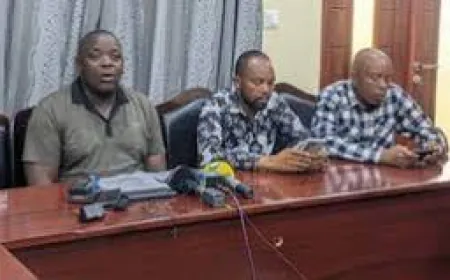Dr. Maftah & Pemba Lead Nuclear Medicine in Tanzania
Dr. Maftah and John Pemba lead the charge in nuclear medicine, breaking barriers and transforming healthcare in Tanzania.

Tanzanian Experts Champion Nuclear Medicine Amid Myths and Stigma
DAR ES SALAAM, April 3, 2025 — Nuclear medicine in Tanzania is emerging as a critical component in the nation’s pursuit of advanced healthcare solutions. With the ability to diagnose and treat complex conditions more effectively, the field is poised to transform medical services. However, its growth faces cultural resistance, persistent misconceptions, and a significant shortage of trained professionals—especially women.
Two leading figures, Pharmacist John Pemba of Bugando Medical Centre and Dr. Tausi Maftah, Head of Nuclear Medicine at the Ocean Road Cancer Institute (ORCI), are reshaping the narrative. Their contributions reflect a broader movement toward embracing nuclear technology for public health, while dispelling fears associated with radiation and gender-specific stigma.
Nuclear medicine was introduced in Tanzania in the 1980s and has expanded gradually. Today, institutions like Bugando Medical Centre in Mwanza have been providing cobalt isotope brachytherapy to cancer patients since 2018. Meanwhile, ORCI—one of the country’s foremost cancer treatment centres—underwent major technological upgrades in 2019, installing linear accelerators and modern radiotherapy equipment that now enable the facility to serve more patients than ever before.
Despite these strides, the country still struggles with a limited pool of nuclear medicine professionals. Public hesitation remains high due to the lingering perception that radiation-based treatment is hazardous. For women, in particular, unfounded concerns about fertility, health risks, and early mortality continue to discourage participation in the field.
John Pemba, who leads the Pharmacy Department at Bugando, believes that a well-trained workforce is essential for delivering nuclear medicine to underserved regions. In 2017, the hospital faced severe capacity constraints, treating just 500 patients daily due to staff shortages and logistical inefficiencies. Pemba helped spearhead a reform initiative, developing a strategic business plan that streamlined operations and boosted patient intake to 1,200 per day within a year. Today, the centre accommodates 2,000 patients daily.
Equally groundbreaking is the work of Dr. Tausi Maftah, Tanzania’s only female nuclear medicine specialist. A trailblazer in her field, Dr. Maftah has completed extensive international training in Europe and the United States. Her achievements were recognised in 2022 when she received the Women in Science Award from the NGO Women in Islam.
Now leading the nuclear medicine department at ORCI, Dr. Maftah is not only providing lifesaving treatments but also advocating for gender inclusion in the field. She stresses the urgent need for more equipment and personnel, particularly women, whose presence could significantly enhance the sector’s development in Tanzania.
“The lack of equipment limits our capacity to treat everyone in need,” she says, “but an even greater challenge is the absence of women in nuclear medicine. If more women enter and stay in this field, the impact on healthcare in Tanzania could be transformative.”
Tanzania’s nuclear medicine journey is part of a wider trend of international collaboration in health technology. Support from the International Atomic Energy Agency (IAEA) has been instrumental, providing access to advanced tools such as PET scans and brachytherapy units.
One of the field’s key global players is Rosatom, Russia’s state nuclear corporation. As one of the world’s top suppliers of medical isotopes, Rosatom supports the diagnosis and treatment of over 2.5 million patients annually across more than 50 countries. It also manufactures both diagnostic and therapeutic isotopes and is among the only two global producers of actinium-225, a cutting-edge isotope with promising applications in future cancer therapies.
Forging partnerships with institutions like Rosatom could help Tanzania accelerate its nuclear medicine capabilities, bringing state-of-the-art treatment to more people and improving national healthcare outcomes.
Ultimately, the growth of nuclear medicine in Tanzania is not just about technology—it is about saving lives, expanding access to care, and challenging outdated beliefs. The dedication of pioneers like Dr. Maftah and Mr. Pemba offers a beacon of hope and a powerful call to action for the next generation of Tanzanian medical professionals.
What's Your Reaction?

































